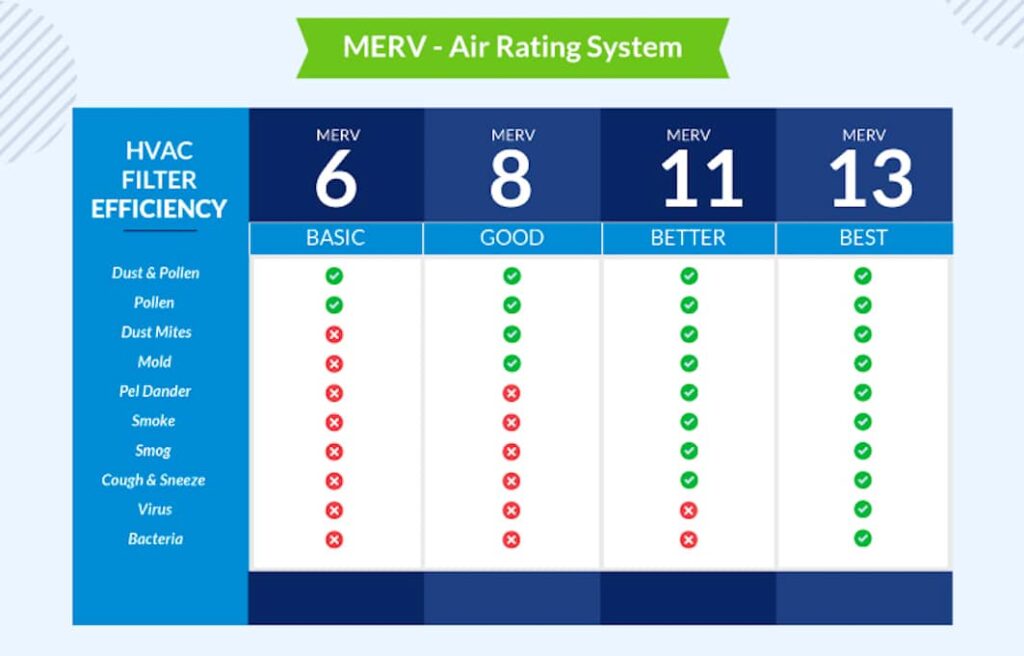Date: August 25, 2023
Air filters are an important tool for keeping indoor air clean and healthy. They are used to remove airborne particles, such as dust, pollen, and pet dander, from the air that we breathe. The type of filter you choose will depend on the size of your space and the level of filtration you need. There are several types of filters available, each with their own advantages and disadvantages. This article will discuss the different types of air filters, explain the MERV rating system, and provide tips on finding the right balance between efficiency and cost.
| Type of Filter | Advantages | Disadvantages |
| Fiberglass | Inexpensive, easy to install, low maintenance | Not very effective at removing particles from the air, can be difficult to clean and maintain |
| Pleated | Highly effective at removing particles from the air, easy to install and maintain | More expensive than fiberglass filters, can be more difficult to find in stores |
| HEPA | Highly effective at removing particles from the air, low maintenance | Very expensive, can be difficult to find in stores |
Types of Filters
When selecting an air filter, you’ll find that there are a variety of options available. The three main types of air filters are fiberglass, pleated, and HEPA filters. Each type has its own set of advantages and disadvantages.

Fiberglass Filters
fiberglass filters are the most common type of air filter. They are made from spun glass fibers and provide basic filtration for particles as small as 3-10 microns in size. Fiberglass filters are inexpensive and easy to install, making them a popular choice for many homeowners. However, they need to be replaced often since they can become clogged quickly with dirt and dust particles.
Pleated Filters
pleated filters are made from synthetic materials such as polyester or cotton and have more pleats than fiberglass filters. These pleats increase the surface area of the filter, allowing it to trap more particles than a fiberglass filter. Pleated filters can capture particles as small as 1 micron in size and typically last longer than fiberglass filters before needing to be replaced.
HEPA Filters
high efficiency particulate air (HEPA) filters are the most effective type of air filter available on the market today. These filters use a dense paper material to capture particles as small as 0.3 microns in size, including pollen, pet dander, smoke, mold spores, and other allergens. hepa filters can last up to 12 months before needing to be replaced, but they come with a higher price tag than other types of air filters.
| Type of Filter | Particle Size Captured | Cost | Durability |
| Fiberglass | 3-10 microns | Inexpensive | Low |
| Pleated | 1 micron | Moderate | High |
| HEPA | 0.3 microns | Expensive | High |
MERV Rating Explained
The Minimum Efficiency Reporting Value (MERV) rating is a system used to rate the overall effectiveness of air filters. The higher the MERV rating, the more efficient the filter. Air filters are rated on a scale from 1 to 16, with higher ratings indicating greater efficiency at capturing particles from the air.
MERV 1-4
Filters with a MERV rating between 1 and 4 are generally considered low-efficiency filters. These filters can be effective in trapping larger particles such as dust and lint, but they are not designed to capture smaller particles such as pollen, pet dander, and mold spores.
MERV 9-16
Filters with a MERV rating between 9 and 16 are considered high-efficiency filters. These filters are designed to capture even the smallest particles, making them ideal for those who suffer from allergies or asthma. However, these high-efficiency filters can also reduce airflow, which can put extra strain on your HVAC system. High-efficiency filters should only be used when necessary, as they may not be suitable for all applications. It’s important to consult an HVAC professional before selecting a filter with a MERV rating higher than 8.
MERV ratings are used to rate air filter efficiency from 1-16, with higher ratings indicating greater efficiency at capturing particles. High-efficiency filters (MERV 9-16) can reduce airflow and should be used only when necessary.
Finding the Right Balance
When it comes to selecting the right filter for your HVAC system, there is a delicate balance between air quality and efficiency. It is important to select the right type of filter as well as the right MERV rating to ensure that your home or business is safe from allergens and other airborne particles while also being energy efficient.
MERV Rating vs. Efficiency
The higher the MERV rating, the more efficient the filter will be in trapping small particles. However, a filter with a high MERV rating can also reduce airflow and make your system less energy efficient. Therefore, it is important to strike a balance between efficiency and air quality when choosing a filter for your HVAC system.
Consider Your Needs
If you have allergies or other respiratory conditions, then you may want to opt for a filter with a higher MERV rating to ensure that you are getting clean air. On the other hand, if you do not have any respiratory issues then you may be able to get away with using a lower rated filter which will save you money on energy bills without sacrificing too much in terms of air quality.
Talk To An Expert
If you are unsure about which type of filter or MERV rating is best for your HVAC system, it is always best to consult an expert who can help guide you through the process. They will be able to give you advice based on your specific needs and help you find the perfect balance between efficiency and air quality. In conclusion, finding the right balance between air quality and efficiency when selecting an HVAC filter can be tricky but with the right information and guidance, it is possible to make an informed decision that will keep your home or business safe from allergens while also saving money on energy bills.
| MERV Rating | Efficiency | Air Quality |
| Low | Reduced airflow & less energy efficient | Lower air quality |
| High | More efficient in trapping small particles | Higher air quality |
Conclusion
Finding the right air filter for your home is an important decision. The type of filter you choose will depend on the size and quality of the air in your home. Fiberglass filters are a great choice for basic filtration, while pleated filters are better for more efficient filtration. HEPA filters are best for those with allergies or asthma, as they provide the highest level of filtration available. The MERV rating system helps you to determine the effectiveness of a filter by measuring its ability to trap particles in the air. Filters with a higher MERV rating are more effective at trapping smaller particles, but can also increase energy costs and reduce airflow. It is important to find a balance between efficiency and cost when selecting an air filter for your home. Overall, there are many factors to consider when choosing an air filter for your home. Taking into account the size of your space, allergens present in your area, and budget will help you make an informed decision that will keep your family safe and healthy.

